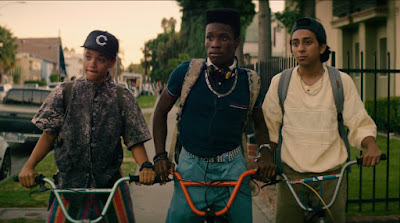One of the more interesting features of documentaries these days is the manner in which the filmmaker decides to let the audience "in" on things: how he or she brings us to the subject at hand. The old-fashioned way (this can still work beautifully) is via simple narration, introducing us to who or what is up for grabs. Newer filmmakers seem to prefer the more challenging route (for them and for us), often leaving out narration entirely and just tossing us into the mix by letting us observe and piece things together as best we can.
Bombay Beach is one good example of the latter form, and now comes another, perhaps not quite so successful, but certainly worth viewing:
12 O'CLOCK BOYS from first-time filmmaker
Lotfy Nathan (shown below).
Fortunately, our largest and most appealing point-of-entry here is via a boy nick-named Pug, whom we come to know best of all the characters on hand. A twelve-year-old when filming commenced, Pug ages a year or so before the film concludes, and it is through his eyes that we are introduced to the 12 O'Clock Boys of the title: dirt-bikers who enjoy speeding around on their bikes (meant for the outback) on the somewhat busy city streets of Baltimore, Maryland. Pug, shown below, is in love with these guys and their speed and ability to lean back on the bikes as they race along until their bodies, as well as their machines, are practically perpendicular to the street (hence, I guess, the film's title -- as they are nearly in the 12 o'clock position.

Pug has tried to join the group a number of times, but clearly, he's too young and too small at this point to be able to ride with them. But, boy, does he try. We also meet his mom, Coco, along with some of the bikers -- Wheelie Wayne and Superman, among them -- and get a little history of these sort-of heroes. Evidently sometime back, a DIY video of them and their riding went viral, turning them into "stars" -- at least locally.

The movie opens, however, with the angry and unpleasant voice of what sounds like somebody calling into a radio show, complaining about the 12 O'Clock Boys and how dangerous they and their bikes really are. The local police may have it in for the boys, too, but from what we hear, those police are not allowed to pursue them for fear of causing further accidents. Evidently the boys have caused a few of their own, though whether this is truth, hearsay or police propaganda, we can't be sure. And Mr. Nathan does little in the way of investigation to clarify this, or much else, in his very homemade movie.

I may have missed an earlier reference to a fellow named Tibba -- whom we meet at his own funeral and later learn was Pug's brother. At that funeral, two women get into a cat-fight. Why? Who knows? We also never learn just how and why Tibba himself died (an accident, somebody notes). Lest we find ourselves rooting too thoroughly for Pug and his mom, we see Coco out for a possible date night at a bar, coming on to a fellow (or is he coming on to her?), and then we view a scene in which Pug mistreats his dog. I am guessing that this is so we'll have been given a warts-and-all look at the family. But the filmmaker resolutely does not want to get near anything resembling an "interview, " in which questions about desires, intentions, lifestyles or interests might be raised -- and character thus brought a bit more to the fore.

We meet a policeman named Lemon, whom the Boys feel is out to get them. Says one: "Fuck all dirty cops, and I'm gonna say that till I die." Lemon is then given a sentence-or-two opportunity to defend himself. From what we're shown here, the Boys may be a bit of a nuisance, but they're hardly the frightened white man's version of a black Hell's Angels troupe. On the other hand, if the Boys
are doing dangerous stuff, they should can it, or at least find spaces more conducive to their biking feats. Might they? Would they? Who knows? While Nathan -- who shot, produced and directed the film -- does not takes sides, neither does he give us enough information to draw much of a conclusion.
What he does do (aside from letting us glance into this relatively new kind of pastime and group), intentionally or not, is allow us to see yet another example of a society in which the power appears to be, still and ever, inherently racist, holding blacks back from anything that might give them pleasure or allow them to show some skill. At the same time, he shows these blacks to be interested in nothing more edifying than riding a bike into that 12 o'clock position. What -- there are no basketball courts around the city? Or -- hello -- a library? Well, maybe not: budget cuts and the new economy, ya know...
12 O'Clock Boys ends with a bit of what-if, wish-fulfillment "verite," that's quite dear, and which makes me wonder if Mr. Nathan has not seen and enjoyed
Bombay Beach, too. His movie, from
Oscilloscope, opens this Friday, January 31, in 21 cities -- from Miami to New York, Baltimore to L.A. You can check out the entire list of playdates, cities and theaters by clicking
here.










































